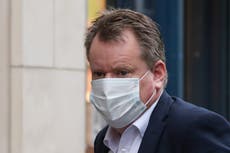Appointment of David Frost to lead post-Brexit talks with EU ‘hits hopes of deal to lift border checks’
Fears that hardline new minister will stamp on hints of agreement to let goods ‘flow more smoothly’ and avoid food price hikes
The appointment of arch-Brexiteer David Frost to lead future talks with the EU is dashing hopes of a deal to lift harsh border checks that will ramp up food prices, industry insiders say.
Importers faced with a blizzard of new red tape had been cheered by a cabinet minister suggesting negotiations would resume with Brussels – ahead of full inspections being imposed from April.
But Boris Johnson’s surprise pick of Lord Frost to guide future trading arrangements – stripping the “dovish” Michael Gove of the role – has provoked fears that the brakes will be slammed on.
Nicknamed “Frosty the No Man” for his hardline stance leading the talks that led to the skeleton Christmas Eve trade deal, the new minister put “regaining sovereignty” ahead of easing the flow of goods.
One industry source said the decision to bring him back showed “the prime minister doesn’t care”, while another expressed the fear that “ideology” had trumped the desire for improving the agreement.
“With Frost in the chair, he will see this is going back on his red line that ‘we don’t renegotiate’ and that we don’t want any form of alignment,” one leading figure warned.
“The problem is not technical, but political with the internal politics of No 10 and the Cabinet Office – it’s ideological,” said another.
To the dismay of the food industry, the UK failed to strike an “equivalence” deal to avoid most form-filling and physical inspections on products of animal origin – so-called sanitary and phytosanitary (SPS) controls.
They have already hit exporters and deliveries to Northern Ireland – but, crucially, the full Irish Sea checks and controls on imports from the EU are yet to come in.
Last week, the environment secretary George Eustice raised hopes when he said the UK was seeking a “veterinary agreement” to “make sure goods can flow more smoothly”.
But industry figures have now been told it could cross the red line of requiring “dynamic alignment” with EU rules – even though they fiercely dispute that it would.
Without a rethink, the SPS checks to be phased in from April will push up prices in British supermarkets because “friction means cost”, food experts say.
Based in the Cabinet Office, Lord Frost will chair both the partnership committee to build on the Brexit trade deal and the joint committee to resolve controversies surrounding the Northern Ireland protocol.
It has already been suggested he will try to “effectively renegotiate” the protocol and that he “thinks Michael’s been too weak on it”.
Both Mr Eustice and Mr Gove are seen as “doves” in the debate over food checks, the latter having realised that Britain is set to experience the huge turbulence destabilising Northern Ireland.
Haulage firms there hiked prices by 12 per cent in a single week last month – and hospitals, schools and prisons have warned of looming problems obtaining food supplies.
In contrast, Lord Frost, a close ally of Mr Johnson, is seen as uncompromising, while the prime minister has not made up his mind about the controversy.
It is hoped a veterinary agreement would move the UK closer to the EU agreement with New Zealand – where only 1 per cent of goods are subject to SPS checks.
Downing Street has been asked to comment on the fears about the impact of Lord Frost’s appointment.
Shane Brennan, chief executive of the Cold Chain Federation trade body, declined to comment on the appointment of Lord Frost, but said a deal was badly needed to cut the number of physical checks.
“It would also provide a consistent interpretation of the rules, so that what is seen as the correct paperwork by one official one day isn’t seen differently by the official the next day – and the next day,” he said.
Likewise, Aodhan Connolly, director of the Northern Ireland Retail Consortium, would not be drawn on personalities, but warned: “We are feeling the effects of this first, but this will also come in for Great Britain and affect household budgets.”
Join our commenting forum
Join thought-provoking conversations, follow other Independent readers and see their replies
Comments




Bookmark popover
Removed from bookmarks